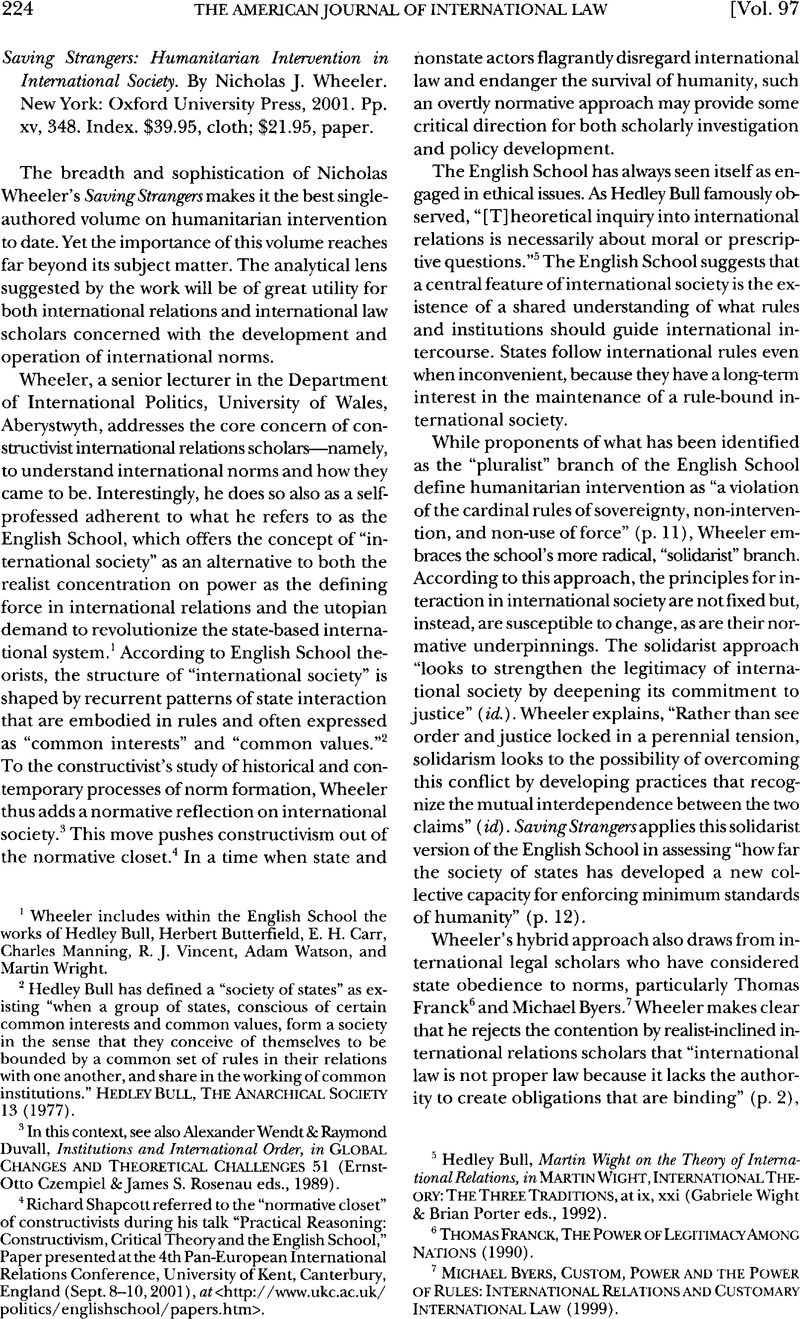No CrossRef data available.
Article contents
Saving Strangers: Humanitarian Intervention in International Society. By Nicholas J. Wheeler. New York: Oxford University Press, 2001. Pp. xv, 348. Index. $39.95, cloth; $21.95, paper.
Published online by Cambridge University Press: 27 February 2017
Abstract

- Type
- Recent Books on International Law
- Information
- Copyright
- Copyright © American Society of International Law 2003
References
1 Wheeler includes within the English School the works of Hedley Bull, Herbert Butterfield, E. H. Carr, Charles Manning, R. J. Vincent, Adam Watson, and Martin Wright.
2 Hedley Bull has defined a “society of states” as existing “when a group of states, conscious of certain common interests and common values, form a society in the sense that they conceive of themselves to be bounded by a common set of rules in their relations with one another, and share in the working of common institutions.” Bull, Hedley, The Anarchical Society 13 (1977)Google Scholar.
3 In this context, see also Wendt, Alexander & Duvall, Raymond, Institutions and International Order, in Global Changes and Theoretical Challenges 51 (Ernst-Otto, Czempiel & Rosenau, James S. eds., 1989)Google Scholar.
4 Richard Shapcott referred to the “normative closet” of constructivists during his talk “Practical Reasoning: Constructivism, Critical Theory and the English School,” Paper presented at the 4th Pan-European International Relations Conference, University of Kent, Canterbury, England (Sept. 8-10,2001), at <http://www.ukc.ac.uk/politics/englishschool/papers.htm>
5 Bull, Hedley, Martin Wight on the Theory of International Relations, in Martin Wight, International Theory: The Three Traditions, at ix, xxi (Wight, Gabriele & Porter, Brian eds., 1992)Google Scholar.
6 Franck, Thomas, The Power of Legitimacy Among Nations (1990)Google Scholar.
7 Byers, Michael, Custom, Power and the Power of Rules: International Relations and Customary International Law (1999)CrossRefGoogle Scholar.
8 Higgins, Rosalyn, Problems and Processes: International Law and How We Use It 4 (1994)Google Scholar.
9 Franck, Thomas & Rodley, Nigel, After Bangladesh: The Law of Humanitarian Intervention by Military Force, 67 AJIL 275, 304 (1973)Google Scholar.
10 See Indep. Int’l Comm’n on Kosovo, The Kosovo Report: Conflict, International Response, Lessons Learned (2001).
11 Michael Reisman, W., Unilateral Action and the Transformations of the World Constitutive Process: The Special Problem of Humanitarian Intervention, 11 Eur. J. Int’l L. 3, 7 (2000)Google Scholar.
12 See, e.g., Mutua, Makau, Terrorism and Human Rights: Power, Culture, and Subordination, 8 Buffalo Hum. Rts. L. Rev. 1 (2002)Google Scholar.
13 Id. at 11.
14 See, e.g., Moral Imperialism: A Critical Anthology (Esperanza Hernández-Truyol, Berta ed., 2002)Google Scholar.
15 Colás, Alejandro, International Society ‘From Below’: Civil Society and the Expansion of International Society , Paper presented at the 4th Pan-European International Relations Conference, University of Kent, Canterbury, England (Sept. 8-10, 2001), at <http://www.ukc.ac.uk/politics/englishschool/papers.htm>Google Scholar
16 See Constructing Worid Culture: International Nongovernmental Organizations Since 1875 (Boli, John & Thomas, George M. eds., 1999)Google Scholar.
17 Held, David, What Hope for the Future? Learning the Lessons of the Past, 9 Ind. J. Global Legal Stud. 381, 394 (2002)Google Scholar.
18 Bull, supra note 2, at xv.




